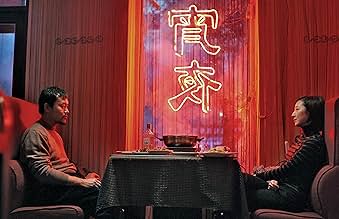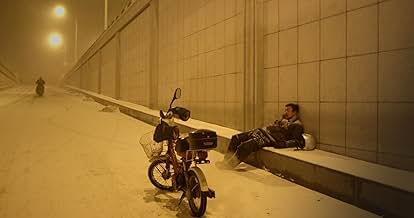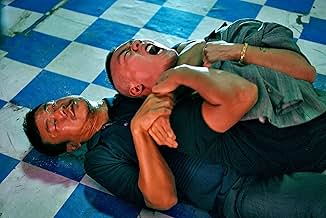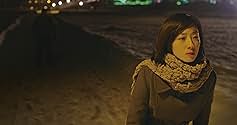NOTE IMDb
6,7/10
10 k
MA NOTE
Un ancien flic et son coéquipier décident de poursuivre l'enquête sur une série de meurtres qui ont mis fin à leur carrière et leur ont causé préjudice, lorsque des meurtres identiques sont ... Tout lireUn ancien flic et son coéquipier décident de poursuivre l'enquête sur une série de meurtres qui ont mis fin à leur carrière et leur ont causé préjudice, lorsque des meurtres identiques sont commis à nouveau.Un ancien flic et son coéquipier décident de poursuivre l'enquête sur une série de meurtres qui ont mis fin à leur carrière et leur ont causé préjudice, lorsque des meurtres identiques sont commis à nouveau.
- Réalisation
- Scénario
- Casting principal
- Récompenses
- 28 victoires et 46 nominations au total
Avis à la une
There are definitely some impressive technical flourishes here. The lighting and the colors used are gorgeous, and really do highlight a lot of the film's atmosphere, which is the other good thing about it. It's able to achieve atmosphere in a rather surprising way, but it's just too bad hat that atmosphere is wasted and doesn't really highlight much. The acting is decent, but the story and the screenplay leave a lot to be desired. The characters just aren't developed all that well, and just are so, so dull. The film's sense of pacing and development are non- existent. I don't think this is anything worthwhile, although I'm sure many will like it just fine.
Black Coal, Thin Ice is the kind of film that can only be felt, the charming point of the film is the indescribable feeling you get from the unique atmosphere. It's a suspense film with sort of Film-Noir feeling, but the plot of the case actually is not so important. As I said, what matters is the feeling. Those empty street shots, environment background sounds, strange acts and even some dark humor tastes. It even looks like a Jia Zhangke's film sometimes.(Well, Jia Zhangke's name did appear in the thank list in the end credits.) Such feeling reached the top in the ending of the pyrotechnical in daytime, it not only reflect the title (The Chinese title is Bai ri yan huo, which means The Daylight Pyrotechnix.) but also release the depressed emotion and atmosphere. (The Uncut Version has very strange but interesting dark humor style scenes in the ending, but they are cut out in the Censored Mainland China Theatrical Version.)
The atmosphere in the film is nearly perfect, however the romance relationship between two characters is not believable at all. The whole film is based on that relationship, but it didn't convince me. Without the reliable relationship, the rest of the film seems not make sense at all. So yeah, it's a rare and unique film in Chinese cinema, it is well did in many aspects, but I don't think it is qualified for Golden Berlin Bear.
My score: 7.5 for the Uncut Version, 7.3 for the Mainland China Censored Theatrical Version.
The atmosphere in the film is nearly perfect, however the romance relationship between two characters is not believable at all. The whole film is based on that relationship, but it didn't convince me. Without the reliable relationship, the rest of the film seems not make sense at all. So yeah, it's a rare and unique film in Chinese cinema, it is well did in many aspects, but I don't think it is qualified for Golden Berlin Bear.
My score: 7.5 for the Uncut Version, 7.3 for the Mainland China Censored Theatrical Version.
A Chinese crime drama with a good storyline and convincing acting. Low key style with a mix of random everyday events and a police investigation. Filmed in a realist style with some surreal moments.
A series of murders, whose hallmarks are numerous body parts being found around the Province, perplex detectives and leave them with a failed investigation. A former member of the force, sacked for incompetence, takes the initiative and follows a lead.
Slow paced but gripping. We are given insights into the characters' lives, motivations and idiosyncrasies alongside their roles in the unfolding world of the murder investigation. What it lacks in action is made up for in a range of intriguing characters and quirky events.
A series of murders, whose hallmarks are numerous body parts being found around the Province, perplex detectives and leave them with a failed investigation. A former member of the force, sacked for incompetence, takes the initiative and follows a lead.
Slow paced but gripping. We are given insights into the characters' lives, motivations and idiosyncrasies alongside their roles in the unfolding world of the murder investigation. What it lacks in action is made up for in a range of intriguing characters and quirky events.
It seems that, every few years, there are one or two Chinese films that, despite being slow-paced, dark, and lacking A-list stars, somehow manage to attract a large domestic audience without being controversial enough to risk complete censorship. In 2014, the only example I have seen so far is this, Black Coal, Thin Ice. The reason for its domestic success is presumably because of its awards at the Berlin Film Festival.
As the story unfolds, despite being based around a series of murders, the film has a pace more similar to an art-house film than a crime- thriller. A couple of scenes were impressively disturbing, made even more so by the slow paced, subtle atmosphere surrounding them.
The setting of a polluted, dark, seedy city in a long Heilongjiang winter seems perfect for the noir tone of the film. A subtle musical score, with some dissonant strings combined with (terrible) Chinese pop songs (intra-diegetic) creates a fantastic atmosphere. The closest thing to it I have seen is Suzhou River, which, now I come to think of it, has a lot of similar motifs (I haven't seen Diao Yinan's previous films).
The acting performances were all impressive, the female lead (played by Taiwanese Gwei/Gui Lun-Mei) seemed suitably out of place in the Far Northeast of Mainland China. Liao Fan's male lead, and Wang Xuebing's character, were both impressive.
Despite a bit of dark humour that made me giggle, Black Coal, Thin Ice is a relentlessly grim and slightly disturbing film. I was impressed that it wasn't (more) censored in China, as it paints a pretty depressing picture. Despite being enthralled by the film, I won't be booking a flight to Heilongjiang any time soon.
As the story unfolds, despite being based around a series of murders, the film has a pace more similar to an art-house film than a crime- thriller. A couple of scenes were impressively disturbing, made even more so by the slow paced, subtle atmosphere surrounding them.
The setting of a polluted, dark, seedy city in a long Heilongjiang winter seems perfect for the noir tone of the film. A subtle musical score, with some dissonant strings combined with (terrible) Chinese pop songs (intra-diegetic) creates a fantastic atmosphere. The closest thing to it I have seen is Suzhou River, which, now I come to think of it, has a lot of similar motifs (I haven't seen Diao Yinan's previous films).
The acting performances were all impressive, the female lead (played by Taiwanese Gwei/Gui Lun-Mei) seemed suitably out of place in the Far Northeast of Mainland China. Liao Fan's male lead, and Wang Xuebing's character, were both impressive.
Despite a bit of dark humour that made me giggle, Black Coal, Thin Ice is a relentlessly grim and slightly disturbing film. I was impressed that it wasn't (more) censored in China, as it paints a pretty depressing picture. Despite being enthralled by the film, I won't be booking a flight to Heilongjiang any time soon.
Funny how all these genius critical theorists here are giving thumbs down to everything but have nothing to say. Why not take my review and bust it to bits, deconstruct it, tell us how horrible it is? Come on, make your sentences pirouette for me.
In the meantime...
How does a Chinese director empty the noir sensibility of any and all of the glamour associated with its Hollywood counterpart? How does it become a study in pure dourness and grimness? If you're Yi'nan Diao, the first thing you do is set it in a place as grim and dour as a northern Chinese factory town circa 1999. In this frozen wasteland that may or may not be Harbin - it doesn't matter, it could be Siberia - the ball gets rolling when dead body parts start showing up on the conveyor belt of a coal processing plant: after all, in this time and space in China, the human body is just another physical commodity
Following a bloody shootout that leaves the two main suspects and two of his partners dead, we jump forward five years to find the surviving detective, Zhang Zili, paralyzed by the trauma, retired from the police force and passed out in the snow in an alcoholic stupor. But things are never what they seem in noir, right? So he's dragged back into the case when a former partner of his suspects the involvement of a black widow- like female at the heart of the matter. An exotic call girl? A mysterious nightclub singer? No - just some depressed woman who works at a dry cleaner's where she's regularly mauled by her piggish oaf of a boss.
The plot is unimportant, really, because the film is one big painting, a night-time world where the neon signs of the internet gambling dens and bleak taxi-dancing joints are beaten into submission by the cold dark chill of northern China, where all color and light are sucked into the film's essence, which is nothing but a black hole, a gravitational death machine that swallows up every photon in sight. At one point, while spinning around the world's most depressing ice skating rink, Zili asks his former partner, "Does anybody ever really win at life?" Of course not. Like all the other catatonic ice skaters, he's just going round and round, sometimes ahead, sometimes behind (depending on one's point of view) getting nowhere while people continue to copulate and kill and die. The key to the film is the direct translation of the Chinese title, which means "daytime fireworks." I'll let you figure that out for yourself, but if you like your noir pitch-black, this one's for you.
In the meantime...
How does a Chinese director empty the noir sensibility of any and all of the glamour associated with its Hollywood counterpart? How does it become a study in pure dourness and grimness? If you're Yi'nan Diao, the first thing you do is set it in a place as grim and dour as a northern Chinese factory town circa 1999. In this frozen wasteland that may or may not be Harbin - it doesn't matter, it could be Siberia - the ball gets rolling when dead body parts start showing up on the conveyor belt of a coal processing plant: after all, in this time and space in China, the human body is just another physical commodity
Following a bloody shootout that leaves the two main suspects and two of his partners dead, we jump forward five years to find the surviving detective, Zhang Zili, paralyzed by the trauma, retired from the police force and passed out in the snow in an alcoholic stupor. But things are never what they seem in noir, right? So he's dragged back into the case when a former partner of his suspects the involvement of a black widow- like female at the heart of the matter. An exotic call girl? A mysterious nightclub singer? No - just some depressed woman who works at a dry cleaner's where she's regularly mauled by her piggish oaf of a boss.
The plot is unimportant, really, because the film is one big painting, a night-time world where the neon signs of the internet gambling dens and bleak taxi-dancing joints are beaten into submission by the cold dark chill of northern China, where all color and light are sucked into the film's essence, which is nothing but a black hole, a gravitational death machine that swallows up every photon in sight. At one point, while spinning around the world's most depressing ice skating rink, Zili asks his former partner, "Does anybody ever really win at life?" Of course not. Like all the other catatonic ice skaters, he's just going round and round, sometimes ahead, sometimes behind (depending on one's point of view) getting nowhere while people continue to copulate and kill and die. The key to the film is the direct translation of the Chinese title, which means "daytime fireworks." I'll let you figure that out for yourself, but if you like your noir pitch-black, this one's for you.
Le saviez-vous
- AnecdotesThe literal translation of the Chinese title is 'Daylight Fireworks'. This is the name of the nightclub where Zhang learns a major lead, and is also echoed in the last scene.
- ConnexionsReferences Xia nu Shisan Mei (1986)
Meilleurs choix
Connectez-vous pour évaluer et suivre la liste de favoris afin de recevoir des recommandations personnalisées
- How long is Black Coal, Thin Ice?Alimenté par Alexa
Détails
- Date de sortie
- Pays d’origine
- Site officiel
- Langue
- Aussi connu sous le nom de
- Black Coal, Thin Ice
- Lieux de tournage
- Sociétés de production
- Voir plus de crédits d'entreprise sur IMDbPro
Box-office
- Montant brut mondial
- 16 830 885 $US
- Durée1 heure 50 minutes
- Couleur
- Rapport de forme
- 1.85 : 1
Contribuer à cette page
Suggérer une modification ou ajouter du contenu manquant

Lacune principale
By what name was Black Coal (2014) officially released in Canada in French?
Répondre






















